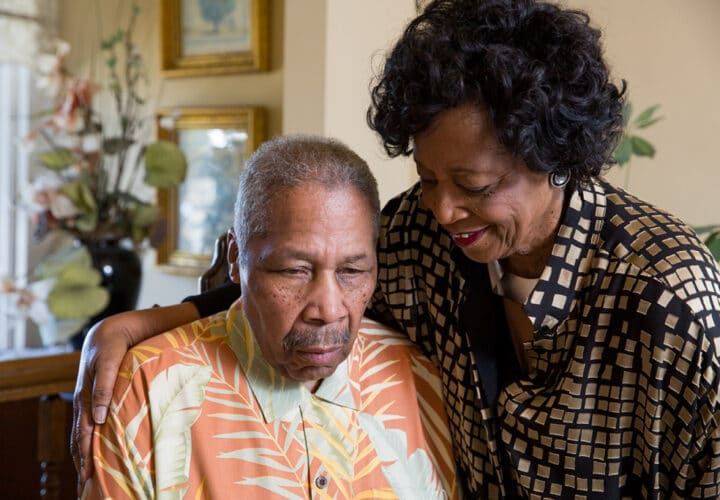As part of our LiveTalk series, Being Patient spoke with elder law and estate planning attorney Mary Jo Broussard Speier about legal planning for people living with dementia and their families after a diagnosis.
People living with dementia face complex legal concerns, and the actions that they take, or don’t take, can have ripple effects on their own lives and the lives of their loved ones. According to Mary Jo Broussard Speier, who offers legal guidance to people with dementia at the Speier Law Firm, people may face different situations as they navigate estate planning and other legal matters following a dementia diagnosis, but there are also key issues that come up often. Being Patient spoke with Speier about some of the most common questions and legal issues that may follow a dementia diagnosis.
1. How do you find an elder law attorney?
Elder law attorneys handle a range of legal matters under elder law, helping people plan for incapacity, long-term care, insurance coverage, and the transfer of assets after they pass away, among other issues.
Speier pointed to the National Academy of Elder Law Attorneys as a helpful resource for finding an elder law attorney in people’s area of residence, adding that people should be thorough in finding an attorney who is the right fit.
“You’re going to have to do your due diligence and maybe call several to see who’s the most affordable or who you get a good vibe from on the phone, but it will be worth it,” Speier said. “A good elder law attorney can save you hundreds of thousands of dollars.”
In the case of Medicaid planning, she said people would likely be overwhelmed with information after the initial meeting with their attorney. They would need to follow up with the attorney if it’s within their financial ability.
“When you leave that first consultation, your head is going to be spinning,” she said. “You have got to sit with it. You have got to go back again and hear what they have to say. That costs money and not all of us have that kind of money.”
Depending on a family’s budget, one alternative, Speier suggested, involves seeking assistance from the librarian at the local courthouse library, who can point to resources and publications for elder law and Medicaid.
2. What is testamentary capacity?
According to Speier, there isn’t a standardized assessment to determine a person’s legal capacity, also known as testamentary capacity, to create or update their will and powers of attorney. Elder law attorneys continually assess their clients by observing their level of awareness during conversations. When attorneys are uncertain about a client’s capacity, they often seek a formal assessment by a medical professional.
Speier said all states have legal criteria of testamentary capacity. Clients need to have a general understanding of what a will is, and that they are creating or changing their will. They need to know who their family members are, or their relationships with others who may be affected by their will. In addition, clients are required to have a general understanding of their properties, and the plan for distributing their properties after death.
3. When should you set up an estate plan?
Speier urged people to create or update their estate plan early in a diagnosis, when they may still have the legal capacity to do so. An estate plan typically includes a will, where people plan and name who they wish to receive the things they own after death, such as real estate, investments, checking and savings accounts, and personal possessions.
The estate plan generally also includes documents for financial and health care powers of attorney, which grant legal authority to a person to act on behalf of another if they lose legal capacity to make decisions.
“The health care power of attorney, which some states call an advanced medical directive, is everything to do with your body, and discussions with your medical providers and medical decisions,” Speier said. “A financial power of attorney is the ticket for your agent to navigate through the financial matters that will impact your life when you no longer have capacity.”
For more guidance on this topic subscribe to our newsletter to be the first to know about upcoming live talks with experts on practical topics related to Alzheimer’s, dementia and caregiving.




Will the session be posted online afterward? Always uncertain about being able to connect at a specific time because my husband’s Alzheimer’s is progressing, of course.
Yes it will be posted on the website!